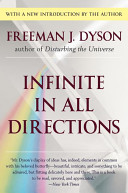Diversification in the Cosmos
The last of the five philosophical problems is the problem of final aims. The problem here is to try to formulate some {298} statement of the ultimate purpose of the universe. In other words, the problem is to read God's mind. Previous attempts to read God's mind have not been notably successful. One of the more penetrating of such attempts is recorded in the Book of Job. God's answer to Job out of the whirlwind was not encouraging. Nevertheless I stand in good company when I ask again the questions Job asked. Why do we suffer? Why is the world so unjust? What is the purpose of pain and tragedy? I would like to have answers to these questions, answers which are valid at our childish level of understanding even if they do not penetrate far into the mind of God. My answers are based on a hypothesis which is an extension both of the Anthropic Principle and of the argument from design. The hypothesis is that the universe is constructed according to a principle of maximum diversity. The principle of maximum diversity operates both at the physical and at the mental level. It says that the laws of nature and the initial conditions are such as to make the universe as interesting as possible. As a result, life is possible but not too easy. Always when things are dull, something new turns up to challenge us and to stop us from settling into a rut. Examples of things which make life difficult are all around us: comet impacts, ice ages, weapons, plagues, nuclear fission, computers, sex, sin and death. Not all challenges can be overcome, and so we have tragedy. Maximum diversity often leads to maximum stress. In the end we survive, but only by the skin of our teeth.
The expansion of life and of mankind into the universe will lead to a vast diversification of ecologies and of cultures. As in the past, so in the future, the extension of our living space will bring opportunities for tragedy as well as achievement. To this process of growth and diversification I see no end. It is useless for us to try to imagine the varieties of experience, physical and intellectual and religious, to which mankind may attain.
Notes:
Taxonomies:
/health and fitness/disease (0.577348)
/science/phyiscs/atomic physics (0.577054)
/careers/job search (0.570884)
Keywords:
maximum diversity (0.970022 (positive:0.750732)), Anthropic Principle (0.755592 (positive:0.409773)), final aims (0.753349 (negative:-0.211411)), philosophical problems (0.747839 (negative:-0.211411)), vast diversification (0.742446 (positive:0.857450)), ultimate purpose (0.736092 (negative:-0.404148)), Previous attempts (0.734698 (negative:-0.351068)), good company (0.720968 (positive:0.785738)), childish level (0.720648 (neutral:0.000000)), nuclear fission (0.704713 (negative:-0.283237)), new turns (0.700947 (negative:-0.561007)), initial conditions (0.700758 (neutral:0.000000)), ice ages (0.691717 (neutral:0.000000)), questions Job (0.691428 (positive:0.785738)), mental level (0.690301 (neutral:0.000000)), universe (0.660442 (positive:0.464605)), God (0.657636 (negative:-0.365078)), tragedy (0.623211 (positive:0.185597)), life (0.577084 (positive:0.857450)), answers (0.549791 (positive:0.409773)), hypothesis (0.542976 (positive:0.644915)), mankind (0.525928 (positive:0.857450)), extension (0.513983 (positive:0.515733)), things (0.500798 (negative:-0.782711)), end (0.500101 (positive:0.264143)), mind (0.497650 (negative:-0.351068)), ecologies (0.480727 (positive:0.857450)), whirlwind (0.478932 (negative:-0.447669)), plagues (0.475101 (negative:-0.354913)), rut (0.473510 (negative:-0.561007))
Entities:
Job:Person (0.877960 (positive:0.169034))
Concepts:
Universe (0.952194): dbpedia | freebase
Philosophy (0.726136): dbpedia | freebase | opencyc
Life (0.566710): dbpedia | freebase
Cosmology (0.566383): dbpedia | freebase | opencyc
Anthropic principle (0.566266): dbpedia | freebase | yago
Nature (0.550126): dbpedia | freebase | opencyc
Book of Job (0.530851): dbpedia | freebase | yago
Fine-tuned Universe (0.520411): dbpedia | freebase | yago





